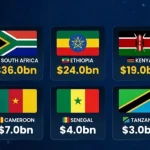Access Holdings Plc has emerged as the clear leader among Nigeria’s tier-1 banks in electronic business income for the first half of 2025, generating ₦101.65 billion from digital transactions.
Collectively, the five major banks, Access Holdings, United Bank for Africa (UBA), Zenith Bank, Guaranty Trust Holding Company (GTCO), and FBN Holdings, earned ₦290.86 billion in e-business income during the period. This represents a 2.2% year-on-year decline from the ₦297.53 billion recorded in H1 2024.
Access Holdings’ Digital Revenue Soars 37.7%
For Access Holdings, the ₦101.65 billion in e-business revenue marks a 37.7% increase compared to ₦73.81 billion recorded in the same period of 2024.
This impressive performance reinforces Access Holdings’ strong positioning in Nigeria’s digital banking and payments ecosystem, supported by its extensive electronic channels such as:
- Mobile and internet banking
- USSD platforms
- Agency banking
- Point of Sale (POS) networks
- Automated Teller Machines (ATMs)
These platforms continue to drive higher transaction volumes and deepen customer engagement in an increasingly digital financial landscape.
UBA, Zenith, GTCO, and FBN See Revenue Declines
While Access Holdings expanded its digital income, other tier-1 players reported notable declines in e-business revenue during H1 2025.
- UBA recorded ₦100.50 billion, a 5.3% drop from ₦106.15 billion in H1 2024.
- Zenith Bank saw an 11.7% decline, earning ₦36.40 billion compared to ₦41.23 billion a year earlier.
- GTCO’s e-business income fell 12%, from ₦32.50 billion in 2024 to ₦28.61 billion in 2025.
- FBN Holdings suffered the sharpest drop, with a 45.9% decline to ₦23.69 billion from ₦43.83 billion in the previous year — a reflection of weaker transaction volumes and migration to alternative digital channels.
Tier-2 Banks Show Mixed Performance
A review of other banks’ financial statements revealed a mixed performance among tier-2 financial institutions:
- Sterling Financial Holding Company reported a modest 2.7% growth, with e-business income rising to ₦4.79 billion in H1 2025 from ₦4.66 billion in 2024.
- Stanbic IBTC also saw a slight improvement, earning ₦2.25 billion in 2025 versus ₦2.15 billion the previous year.
- Wema Bank, however, recorded a significant 59% decline, with e-business income dropping to ₦8.5 billion from ₦20.9 billion in H1 2024, despite being the top-performing digital lender among tier-2 banks.
E-Business Income: A Growing Indicator of Digital Transformation
For Nigerian banks, e-business income represents earnings from electronic channels, card products, and related services. These include mobile apps, USSD platforms, ATMs, POS terminals, agency banking, and internet banking.
The continued expansion of digital transactions reflects the banking industry’s strategic shift toward technology-driven services, catering to a growing base of digitally active customers and supporting Nigeria’s broader cashless economy initiative.
Key Insight
Access Holdings’ strong e-business growth highlights the bank’s dominance in Nigeria’s digital payments landscape, even as some competitors navigate declining transaction revenues.
With sustained investments in technology, financial inclusion, and omnichannel banking, Access Holdings is positioned to maintain its lead in the digital banking race through 2025 and beyond.
















